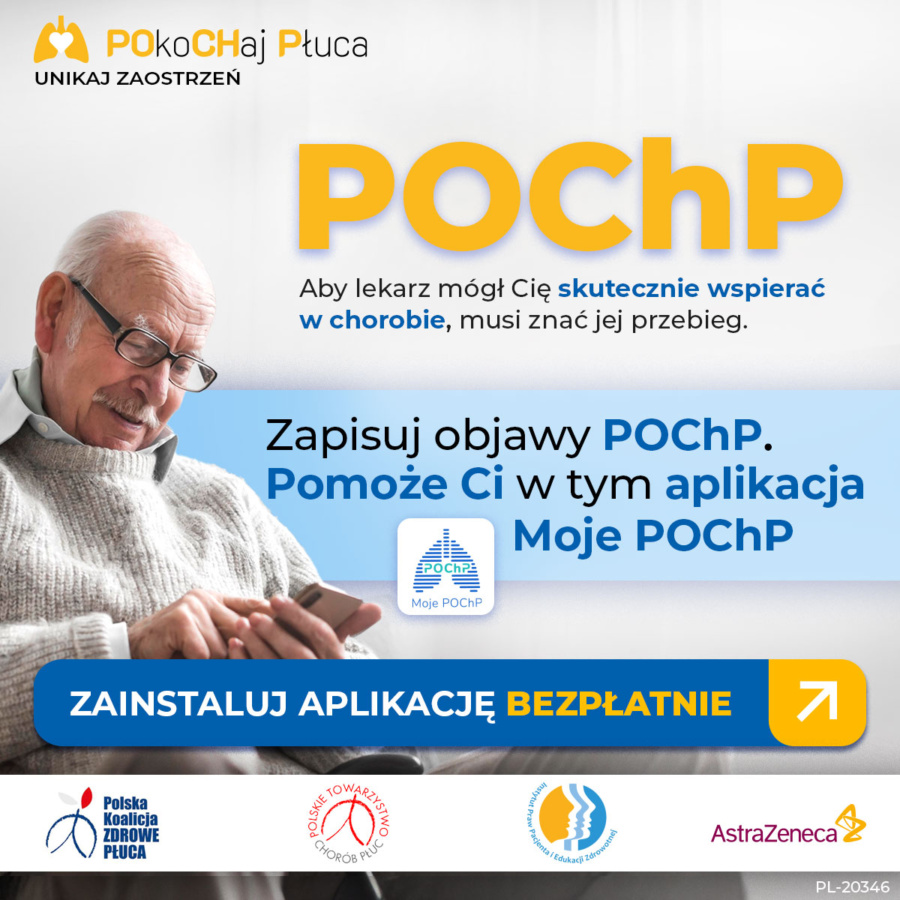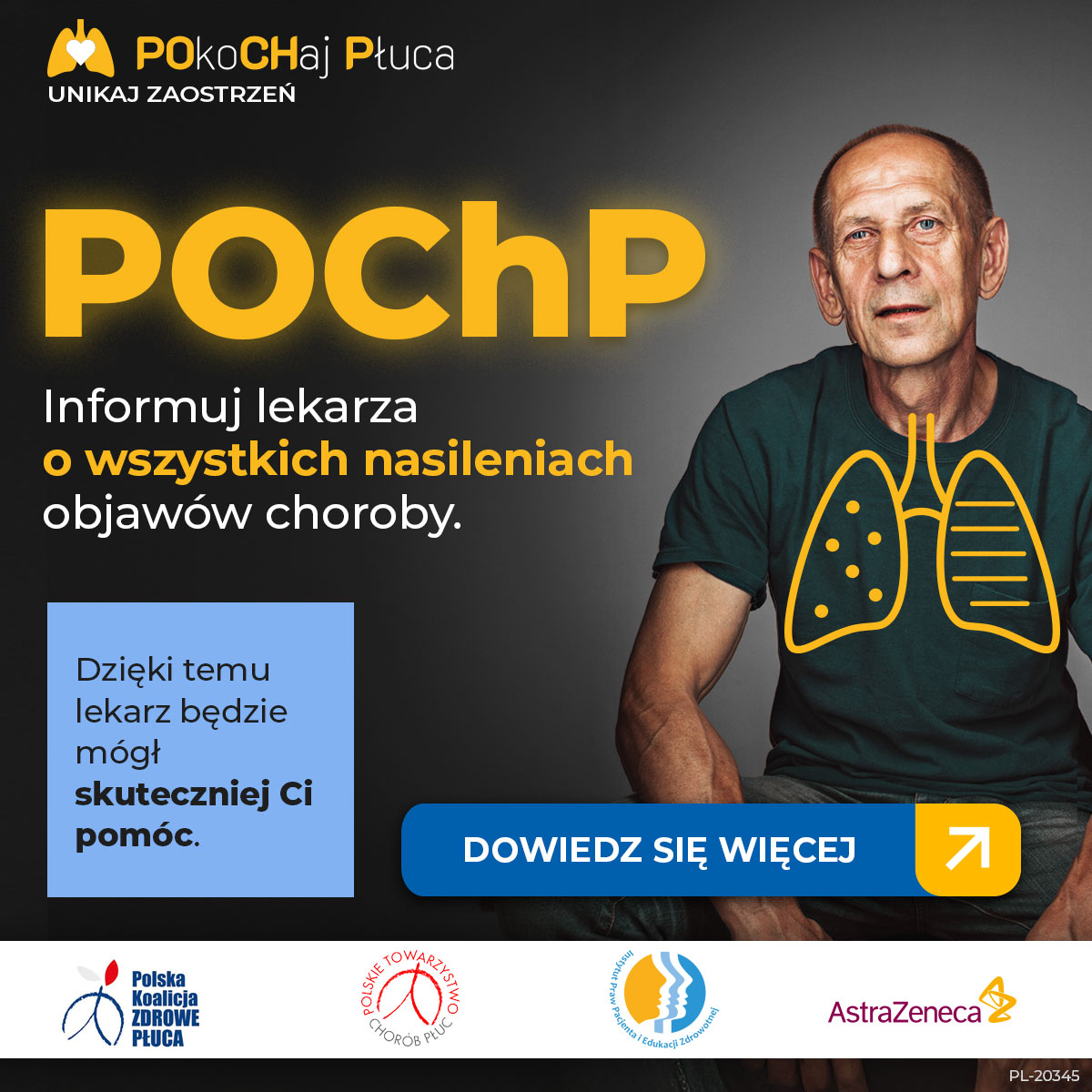Chronic obstructive pulmonary disease (COPD) is a progressive disease, but with appropriate treatment, the risk of further dangerous exacerbations with irreversible consequences can be reduced. It is important that patients with COPD are well prepared for their doctor's appointments, are mindful of them, are able to recognise the severity of their symptoms and report them to their doctor. This will make it easier to select the appropriate management appropriate to the patient's condition. The My COPD app makes it easier to record the symptoms of the disease, thereby improving communication between patient and doctor. It also increases the chance of identifying exacerbations.
The educational campaign entitled. 'Love your Lungs. Avoid Exacerbations', which aims to raise awareness of COPD exacerbations, the ability to monitor the severity of the disease's symptoms and report them to your doctor in a timely manner.
Chronic obstructive pulmonary disease (COPD) is the most common chronic respiratory disease and the third cause of death worldwide. It manifests as difficulty breathing and leads to permanent, irreversible problems with lung function. The most commonly noted symptoms are dyspnoea (occurring intermittently or daily), chronic cough, chronic expectoration of sputum.
Smoking is the main contributor to COPD, but recurrent, untreated bronchitis and air pollution or working in harmful conditions (e.g. dust in the air) can also cause it.
The disease affects both men and women. The first symptoms may appear as early as approximately 45-50 years of age. In Poland, it is estimated that around 2 million people suffer from COPD, while the advanced form affects around 400,000. COPD has a significant impact on quality of life, which significantly deteriorates due to the symptoms and limitations associated with the disease. It affects many aspects of daily functioning or leads to disability.
COPD exacerbation - don't ignore, report to your doctor
The most dangerous event for the patient in the course of COPD is an exacerbation. Due to a cold (viral infection), bronchitis or other factors, the patient experiences a sudden increase in COPD symptoms. This is a sign that lung function is rapidly deteriorating. Symptoms of exacerbations that should be noted are:
- Enhanced dyspnoea - more than usual,
- exacerbated cough - more than usual,
- increased sputum production or change its colour (yellow or yellow-green),
- wheezing - during breathing, caused by narrowing of the airways,
- fatigue, weakness, malaise - which can result from breathing difficulties and general strain on the body,
- a feeling of tightness in the chest - bpain or discomfort.
If the patient experiences worsening symptoms of COPD and should seek medical attention as soon as possible and give him all the information about the deterioration of his condition. This will enable prompt, appropriate and therefore effective treatment to be undertaken, which in turn will have an impact on the quality and length of life of the person with COPD. Exacerbations are most easily treated early on, when symptoms are still minor.
- In Poland, the failure of patients to report exacerbations has been a serious problem for years. This makes it difficult, for us doctors, to choose the optimal treatment, leads to a faster progression of the disease and, consequently, to a poorer quality of life, to disability or even death. Also, a large proportion of patients - even approx. 55% - treats them himself at home without telling the doctor - states dr n. med. Malgorzata Czajkowska-Malinowska, national consultant in lung diseases, President of the Polish Lung Association.
A COPD exacerbation usually lasts 7-10 days, but deterioration can persist much longer. Up to 8 weeks after an exacerbation to 20% patients do not return to their previous health status. Often, due to an exacerbation of COPD lasting longer, if it is not reported to the doctor early enough, patients have to be hospitalised. As statistics show, just one moderate exacerbation means a 21% increase in the risk of hospitalisation, and 1 in 5 patients die within a year of their first COPD hospitalisation. In Poland, the mortality rate within the first 3 months after a severe exacerbation is 10%. The risk of death after a COPD exacerbation is therefore higher than the risk of death after a myocardial infarction, while the risk of exacerbations increases with each subsequent exacerbation episode.
COPD can be treated effectively
The aim of COPD treatment is to alleviate symptoms and reduce the risk of exacerbations, slow the progression of the disease, improve quality of life and exercise tolerance, counteract deterioration of lung function and premature death.
Appropriate treatment for COPD should be implemented as soon as possible to prevent the disease from progressing. Most drugs are used in inhaled form and the choice of treatment depends on the doctor's assessment of the patient's condition. The mainstay of treatment is 2 types of inhaled bronchodilators. In addition, some people with COPD are prescribed an anti-inflammatory drug. The latest therapeutic options are also available - three-component inhalers. Modern treatment is available to all COPD patients in Poland. - Those over 65 years of age receive it free of charge. In exacerbations, and further stages of the disease, oral corticosteroids, antibiotics and home oxygen treatment are also used.
Regular use of medication improves prognosis, reduces the risk of exacerbations and hospitalisation. In order for the doctor to be able to effectively support the patient and choose the appropriate treatment, he or she should have a true picture of the disease. It is important, therefore, that the patient keeps a diary and records all symptoms (including those that he or she considers typical or obvious), that he or she is well prepared for each visit to the doctor, that he or she remembers and reports episodes of worsening of the disease symptoms or situations where they have worsened over several days, as well as unscheduled medical visits due to increased cough or dyspnoea. A routine follow-up visit - usually to a pulmonologist - should be prepared especially for a person who does not go regularly to the doctor. It is important for the patient to monitor his or her disease, as this will help prevent further exacerbations and make it easier for the doctor to choose the right therapy.
- As the incidence of COPD is set to increase due to, among other things, an ageing population and associated comorbidities, as well as environmental pollution, it is important to carry out educational activities in this area. Through education, patients feel more informed and involved in the treatment process, leading to better health outcomes and an improved quality of life for them - says Igor Grzesiak, vice-president of the board of directors at the Institute for Patients' Rights and Health Education, and a supporting partner of the 'Love Your Lungs. Avoid Exacerbations'.
With My COPD, the patient will not forget the symptoms of his/her disease
My COPD is the first Polish application to work on the principle of an electronic diary. - It aims to make it easier - by enabling the history of symptoms to be documented more effectively - to communication between the COPD patient and the doctorand consequently increase the chance of recognising the severity of COPD symptoms and possible exacerbations. The doctor, knowing more precisely what symptoms accompany the patient on a daily basis, will be able to better adapt the treatment and thus help more effectively. On the other hand, with the COPD app, the patient no longer has to write down his or her symptoms on cards or in a notebook and is always prepared for a follow-up visit. - explains Dr Czajkowska-Malinowska.
Using the app is very simple and involves answering 6 short questions once a week. Questions include the severity of symptoms, visits to the doctor and taking additional medication. Each week the patient also receives a reminder to complete the diary. An automatically generated report allows for more effective recognition of past exacerbations. The application also has an educational function: as the patient fills in the diary regularly, he or she gradually learns which symptoms or situations to look out for.
The application is free of charge. It can be downloaded to the phone via the app shop (Google Play or AppStore). Registration is not required. The app can be used as soon as it is installed:
- Android: https://qr.short.az/MojePOChPAZimmunologiaandroid,
- iOS: https://qr.short.az/MojePOChPAZimmunoloiaIOS.


